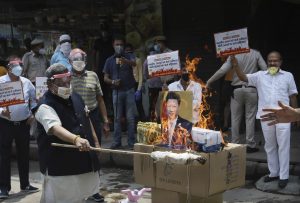India announced on Thursday that its officials will not attend the opening or closing ceremonies of the 2022 Winter Olympics in China, after Beijing chose as a torchbearer for the event a military commander who was involved in the bloody face-off between the Indian Army and China’s People’s Liberation Army (PLA) in the Galwan Valley in June 2020.
The violent clash on the night of June 14-15, 2020, in Galwan Valley in Ladakh, which saw hand-to-hand combat between soldiers of the two sides, was the first time in 45 years that lives were lost along the Line of Actual Control (LAC), the de facto border between India and China.
While both sides hurled rocks at each other that night, a Chinese assault team reportedly “hunted down and slaughtered” Indian soldiers “with iron rods as well as batons wrapped in barbed wire.”
Qi Fabao, a PLA regiment commander who participated in this violence, was among the 1,200 torchbearers in the Games. He has been feted in the Chinese media as a hero.
“Qi Fabao, a PLA regiment commander who sustained head injury while fighting bravely in the #Galwan Valley border skirmish with #India, is a torchbearer during Wed’s #Beijing2022 Winter Olympic Torch Relay,” China’s Global Times tweeted on Wednesday morning.
On Thursday, India’s Ministry of External Affairs announced that the charge d’affaires of its embassy in Beijing will not be attending the opening or the closing ceremonies of the Winter Olympics. “It is indeed regrettable that the Chinese side has chosen to politicise an event like the Olympics,” the MEA said. Shortly after the MEA’s announcement, national broadcaster Doordarshan said it will not telecast live the opening or closing ceremonies.
India is the latest of several countries to announce a diplomatic boycott of the Winter Olympics.
Countries like the U.S., Australia, Canada and Britain had said that they would not be sending official delegations to attend the event in protest of China’s persecution of Uyghurs and other Turkic peoples. Announcing its diplomatic boycott of the Winter Olympics in early December, the U.S. said that the “ongoing genocide and crimes against humanity in Xinjiang” had prompted its decision. Athletes from these countries will compete in the Games, however.
India has just one athlete — skier Arif Mohammad Khan, a Kashmiri — participating in the Games and he will compete as scheduled. Incidentally, this is the first time that an Indian has qualified for the Winter Games.
The Chinese decision to include Qi as a torchbearer in the Olympics is not just about needling India at a time when relations between the two neighbors is very tense.
It is more about rewriting the narrative of what happened that night in Galwan Valley in a way that presents the PLA in a favorable light.
Prior to the bloody clash at Galwan Valley, talks between Chinese and Indian military officials had resulted in the Chinese agreeing to a “partial deinduction” from some points, including at Galwan Valley. They removed tents and pulled back troops and vehicles. However, when Indian soldiers went back to check if the Chinese had indeed left Galwan Valley, they found they hadn’t. An angry verbal exchange followed. Soon after PLA soldiers returned armed with clubs and iron rods to attack the Indian soldiers.
Soon after the Galwan clashes, the Indian Army said it had lost 20 soldiers in the face-off. China, however, remained silent on the number of casualties the PLA suffered. Then in February 2021, the Chinese government said it had lost four soldiers, including a battalion commander.
However, according to a recent study published in an investigative Australian newspaper, The Klaxon, “China’s losses” in Galwan Valley “were much higher than reported with many soldiers drowning while crossing a fast-flowing, sub-zero river in darkness.” It put the figure at around 38 dead.
This reaffirms what India has been saying over the last 19 months: the casualties that the PLA suffered at Galwan Valley were far higher than that of the Indian Army.
Hence China’s reluctance to disclose the casualty figures for months. It did so in February 2021, only after photographs of a grave of one of the PLA soldiers killed in the face-off began circulating on Chinese social media. It prompted questions among Chinese social media users about the failure of Beijing to acknowledge the death of its soldiers.
China’s propaganda campaign on the border tensions with India has focused on Galwan Valley. It has widely circulated photographs of allegedly captured and injured Indian soldiers to show that the PLA inflicted heavy losses on the Indian Army.
By fielding Qi as a torchbearer at the Winter Olympics, China is once seeking to showcase the Galwan Valley face-off as a victory for the PLA, when it was not.
When Western countries announced their diplomatic boycott of the Winter Olympics, Chinese Foreign Minister Wang Yi condemned their “politicization” of the Olympics. The “political maneuvering of a few politicians” would “only expose their ugly intention,” he said.
China’s fielding of Qi as a torchbearer has laid bare the political maneuvering and ugly intentions of its own leaders.

































